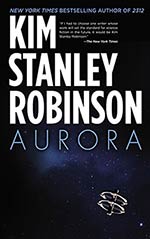
![]() couchtomoon
couchtomoon
7/18/2015
![]()
It was as if she were the steward on the boat crossing the Lethe. It was as if they were dying. It was as if they were killing themselves. (loc. 4226)
How to share the essence of a breathtaking space drama without spoiling the most enjoyable discoveries? How to present the humor, the tragedy, the joy, the humanity, the realism without revealing the important parts? How to convey Aurora's "as-ifness" without overblowing it with hype?
Narratives, Robinson's narrator tells us, "are futile and stupid" (loc. 1643).
Lots of talk about analogies and metaphors in this generation starship novel that starts with a boat wreck and ends on a beach. It's an emotional Hard SF journey into the stars over the course of more than three hundred years. In between the plot, the drama, and the don't-you-dare-call-them-infodumps, Robinson plays literary games. He switches philosophical gears. He dissects his writing style. The construction of the narrative is part of the journey, and so much of that story seems to be telling us something important.
But it's a different message from what we're used to getting from Robinson, his particular brand of utopian realism being more real than utopian compared to his celebrated Mars series.
This pessimism, or dark realism, whichever it might be, enraged Speller and Heloise, and everyone trying to make the best of things, trying to find a way forward. Why be so negative? they asked.
"It's not me being negative," Aram would reply. "It's the universe obeying its laws. Science isn't magic! We aren't fantasy creatures! We have been dealt a hand." (loc. 2572)
For readers who have abandoned KSR in the past, the don't-you-dare-call-them-infodumps are more polished, entertaining, and, by a charming bit of magic in the narrative voice, almost conversational. The psychology takes on complex group and family dynamics over Robinson's favored planetary temperaments and mood disorders. Robinson is relaxed. And no matter what kind of epic Kim Stanley Robinson is writing, he always finds creative ways to resolve character continuity over these vast stretches of time. Characters are important to him, and Aurora's depictions are as smooth and sophisticated as it gets.
A question, though, because I really don't know: can an EVA be that floaty and peaceful when the starship is travelling at one-tenth the speed of light? (I'm guessing the answer is yes, because KSR researches everything.)
Also, I'm surprised by the lack of sexual diversity and queer representation. This is not typical of Robinson, but not too surprising given the structured lifestyle on board the ship, where everything is matter of survival and propagation. Robinson is depicting a very different culture from what we're used to seeing from him, and we really only get to know a few characters. But it sure as hell ain't Mars.
But my biggest question: Why doesn't this starship have a name?
Because names are just silly. You can call anything anything, but that doesn't make it so. (loc. 163)
Well, I know what I would name the ship. (Oh, our favorite AI, Pauline, has a bit of a cameo here, but it's shot down quickly.)
Aurora is the only 2015 release I've read so far, but I know it will be my favorite of the year. Kim Stanley Robinson is the only author I've read who makes me feel like I am actually reading the future, with real people, real events, and, yes, real science. He invokes humanity, while poking at our dreams with a screwdriver.
http://couchtomoon.wordpress.com